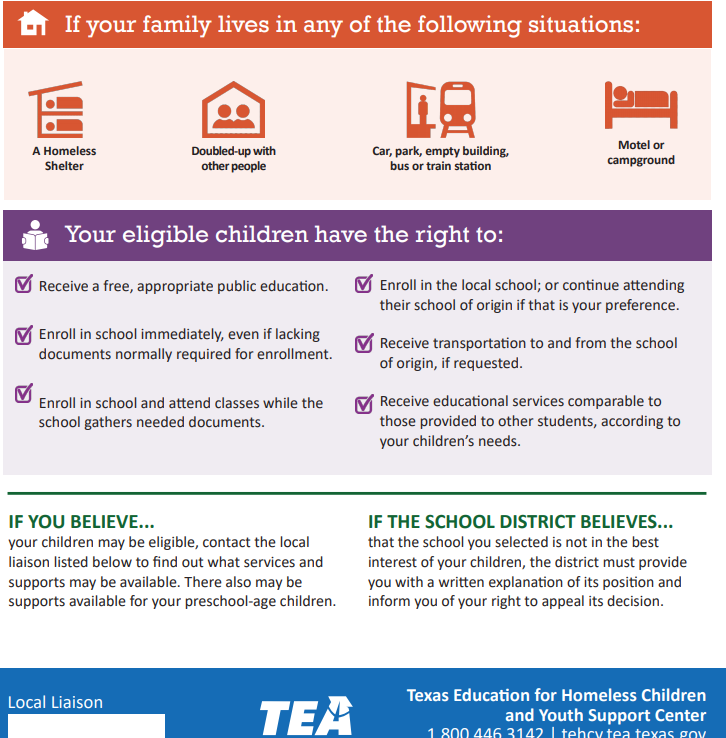McKinney-Vento Homeless Assistance Act
Homeless Education Program Overview
Defining Homeless
The McKinney-Vento Act defines homeless children as "individuals who lack a fixed, regular, and adequate nighttime residence." The act provides examples of children who would fall under this definition:
Children and youth sharing housing due to loss of housing, economic hardship or a similar reason
Children and youth living in motels, hotels, trailer parks, or camp grounds due to lack of alternative accommodations
Children and youth living in emergency or transitional shelters or transitional housing (this generally includes a time limit on the housing assistance and case management by the housing agency)
Children and youth whose primary nighttime residence is not ordinarily used as a regular sleeping accommodation (e.g. park benches, etc)
Children and youth living in cars, parks, public spaces, abandoned buildings, substandard housing, bus or train stations
Children and youth abandoned in hospitals
Migratory children and youth living in any of the above situations
Eligibility
The McKinney-Vento Homeless Education Act makes certain provisions available for homeless students, and defines homelessness as lacking “a fixed, regular, or adequate nighttime residence.” A student is considered homeless if he/she lacks any one of these three and lives…
in a shelter
in a motel
in a car, park, bus station, or other public space
in a campground or substandard house or trailer (no utilities, open to outside elements, pest infestation)
doubled-up with another family on a temporary basis due to loss of housing
as a youth unaccompanied by a parent or legal guardian
McKinney-Vento Rights for Students
Students who are experiencing homelessness have the right to…
enroll in their school of origin (school of attendance when student became homeless), OR enroll in the school that is zoned for the area where they currently live. (NOTE: McKinney-Vento students do not have the option to choose any school in the District.)
enroll immediately and attend school, even if the student does not have the usual documents necessary for enrollment, including proof of residence or proof of guardian. (NOTE: Schools MUST permit homeless students to enroll without documents.)

McKinney-Vento Poster for School-Age Youth -English/Spanish
Texas Education Agency Texas Homeless Network Texas Education for Homeless Children & Youth (TEHCY) Website Texas Appleseed Texas Network of Youth Services National Center for Homeless Education
Dispute Resolution
Disagreements over school enrollment and best interest determinations must be resolved through the dispute resolution process. While in the dispute resolution process the child is entitled to attend the campus in question until the matter is resolved.
The McKinney-Vento Homeless Education Assistance Act provides important protections and rights for homeless children and unaccompanied homeless youth. Pursuant to the Act, students experiencing homelessness must be immediately enrolled in the school of origin or the school in the attendance zone where the student currently resides. Disagreements over eligibility, school selection, or enrollment may be disputed. If a dispute arises the child or youth must be immediately enrolled in the school of origin or school located in the child’s attendance zone, as requested by the parent, guardian, or unaccompanied youth, pending final resolution of the dispute, including all available appeals.
McKinney-Vento (MV) disputes should be resolved locally, whenever possible and must go through the local McKinney-Vento Dispute Resolution process. To learn more about filing a dispute within a district, please consult with the District McKinney-Vento Homeless Liaison. The McKinney-Vento Liaison is available to assist homeless students and families with filing an appeal and navigating the dispute resolution process. If a resolution is not reached locally, then MV disputes may be submitted to TEA.
A student or parent who is dissatisfied by the district’s eligibility, school selection, or enrollment decision may appeal through policy FNG(LOCAL). The district will expedite local timelines, when possible, for prompt dispute resolution. District policy requires the parent, guardian, or unaccompanied youth to use the dispute resolution process set out in FNG(LOCAL), beginning at Level Two. [See FDC(EXHIBIT–B) for the Notice of Parent and Student Rights in the McKinney Vento Enrollment Dispute Resolution Process.] Filling out this form is the first step in that process.
Fort Worth ISD Interactive Slides: Let's Read & Let's Chill
These 2 slides created by Fort Worth ISD's O.P.E.N. DOORS HOMELESS EDUCATION Department provide links to read aloud stories & various videos on YouTube for relaxation (calming music, exercise/stretching, art)
Grandfamilies Resource Hub
The Ohio Statewide Family Engagement Center has launched a new Grandfamilies resource hub. Relatives who provide care for minor children are referred to as kinship caregivers, and grandfamilies are one of the forms of kinship caregiving. The GrandUnderstandings project provides resources to assist grandfamilies and educators. One of the resources, School Family Engagement with Grandfamilies in Mind, provides research-based strategies for educators engaging grandfamilies.
Contacts
Tiffany Jones is CISD's Local McKinney-Vento Liaison; tiffany.jones@cliftonisd.org or (254)675-1826.
For TEHCY program specific questions or concerns, contact the TEHCY Support Center at:
TEHCY Hotline: 1-800-446-3142
TEHCY staff are available Monday through Friday, 8:00 AM to 8:00 PMTEHCY Email: tehcy@esc13.net
